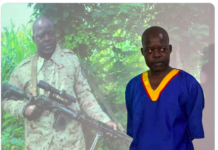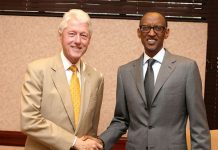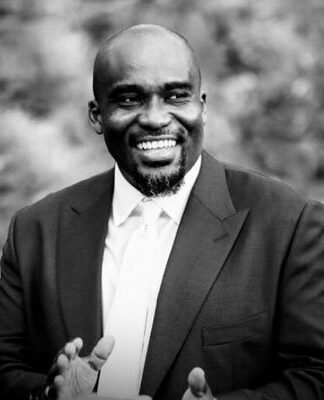Rwanda, on Monday submitted to the UN sanctions committee its rebuttal on allegations contained in an addendum to a Group of Experts report that claims Kigali is backing the M23 rebels, who have, over the last two months, seized parts of eastern Democratic Republic of the Congo (DRC).
Last week, members of the UN Group of Experts (GoE) on the Congo visited Kigali to get Rwanda’s side of the story – weeks after releasing the partial version, which has since resulted in some development partners suspending aid.
“We are eager to see what the final report will look like; we systematically responded to every allegation with concrete evidence that proves the accusations were unfounded,” Foreign Minister Louise Mushikiwabo told journalists in Kigali yesterday.
One of the flaws In the GoE draft report is the claim that the Rwandan military trained, for two weeks, M23 rebel recruits at the Kanombe military barracks before deployment to DRC, supplied the mutineers with ammunition and fatigues, and that senior defence and military officers were actively involved in the formation of the rebel group.
However, the set-up of Kanombe barracks does not enable any such training.
“It is common (and verifiable) knowledge that Kanombe is a garrison-type barracks that comprises living quarters; a referral military hospital also open to civilians; a cemetery; and five service support units’ headquarters and related facilities”, the rebuttal explains.
“It wouldn’t require any form of expertise to find out that this (Kanombe) barracks cannot host the training of recruits or any other force preparation activity. A simple tour of Kanombe barracks would have led the GoE to easily discard this allegation wherever they got it from.”
The government also dismissed claims that the Rwanda Defence Forces (RDF) provided M23 commanders with 75mm canons and their ammunition, saying RDF does not hold 75mm canons in ordinance stores and has never purchased such canons or their ammunition.
“Remnants of these weapons and ammunition from the 1990 – 94 war of liberation were disposed of in 2008, which is well documented by the RDF ordinance regiment.
Moreover, through RDF participation in several joint-operations with FARDC, including the recent operations codenamed AMANI-LEO and UMOJA-WETU, the Government of Rwanda has credible information that FARDC, unlike RDF, maintains 75 mm canons and anti-tank rifle grenades on their arms/ammunition inventory,” it says.
Rwanda also proves that it never facilitated movement of M23 troops and equipment from Bukavu (in Eastern DRC) to Gisenyi (Rubavu), showing it was technically impossible since “RDF motorised zodiac boats cannot carry 60 personnel and tones of equipment back and forth at night without detection by FARDC (Congolese army) border patrols.
“It is equally impossible to drive RDF 15 tonner trucks along the route reported by the GoEs. The alleged route is under major construction and there is no way it could support night movement involving heavy trucks”.
On the allegations that the Permanent Secretary of the Ministry of Defence, Brig Gen Jacques Nziza, had been deployed to Ruhengeri (Musanze) and Gisenyi to supervise and coordinate military, financial, logistic and mobilization activities for the new rebel group, the government rebuttal explains that Nziza, by virtue of his position – Running the day-to-day activities of the Defence ministry – deploying him would amount to grounding the institution’s core activities.
“The General has provided copies of his daily meetings including detailed logs of 114 people that he met at the Ministry of Defence during the same period of the alleged deployment to Gisenyi at Annex F to this submission. The GoE is invited to review the annex and hopefully realise how important it would have been to carry out their own verifications rather than rely on undependable sources”.
The rebuttal also addresses allegations that Congolese rebel leader, Gen Bosco Ntaganda owns property in Rwanda.
“The so-called evidence of a house pictured allegedly belonging to Ntaganda is demonstrably inaccurate. Investigations on the matter indicate that the house presented as image 15 in the addendum is owned by Mr. Innocent Ndagano, alias “Cent Kilos”. The certificate of registration of lease title No. UPI 3/03/04/05/217 is available in Annex J to this submission.
On other allegations that Gen. Ntaganda is the partial owner of Hotel Bushokoro located at Kinigi, Musanze, available evidence, submitted to the UN, shows the property is owned at 50 percent each by Mr Enock Munyajabo and his wife Mrs. Kesie Nyiramana, under the certificate of registration of emphiteutic lease title No. UPI 4/03/07/03/329 .
Kigali further dismisses claims that several RDF officers were involved with M23 rebel recruitment and training drive, with evidence of the whereabouts and assignments of the implicated officers during the time of their alleged involvement with the rebels.
It also challenges allegations of “signal interception” by FARDC of radio communications between RDF and M23 rebels, with technical arguments.
“The evidence provided is one of the most unsophisticated pieces of fabrication in the entire report… On the basis of “image 10” on p.16 of the addendum (i) the mode of communication indicated is a single frequency per channel also referred to as a ‘direct mode operation’; (ii) encryption seems to be based on a manual cipher system also known as SLIDEX; (iii) the frequency is VHF (high) and the frequency range (159,500.00 KHz – 160,900.00 KHz – 161,000.00 KHz) indicates some equipment of commercial standard”.
“Hence, it is technically incompatible with the RDF VHF communication system which uses PRC family military standard with low VHF rage operating from 30 – 80/108 MHz which means that a two-way communication would be impossible; (iv) Furthermore, RDF uses digital encryption imbedded in its communication assets which confirms that a two way communication is not possible in this case”.
Asked whether she was optimistic the rebuttal would help influence the GoE final report, due in November, Mushikiwabo said, “We did our job, and we did it thoroughly; we cannot guarantee that those who biased it in the first place will act differently for the final report.”
“We believe the Security Council will objectively look at the facts we have submitted”.
Regarding reports of aid cuts and delayed disbursement of aid for this fiscal year pending publication of the final UN report, the minister pointed out that Rwanda has retained good relationships with development partners and that some of the reports were overstated.
“There has been some exaggeration in the media about this issue; some governments had alerted us about their intentions to delay funds about – between three weeks to a month earlier,” she said, adding that “With or without aid, Rwandans must survive”.
Shortly before the news conference yesterday, Mushikiwabo briefed diplomats resident in Kigali about the government’s rebuttal. On Monday, she had briefed non-resident envoys accredited to Rwanda about the issue.
Development partners finance nearly half the country’s budget.
Rwanda is widely credited for effective use of aid.
Contact email: james.munyaneza[at]newtimes.co.rw































































